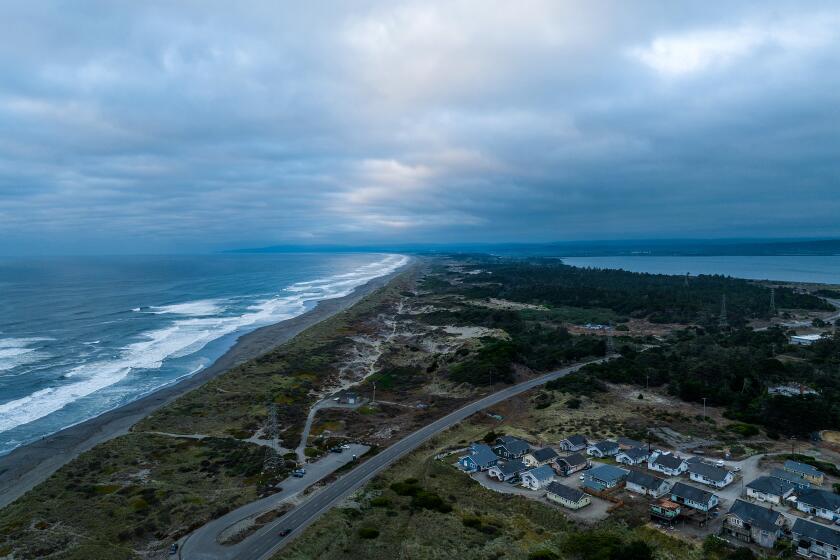Hospice Dispute Turned Over to Federal Agency
THOUSAND OAKS — A neighborhood dispute over a home for the dying on the scenic shores of Westlake Lake has been turned over to federal officials, who are looking into charges of discrimination by homeowners who oppose the plan.
Isobel Oxx said she filed a complaint with the U.S. Department of Housing and Urban Development this summer after neighbors opposed her plans to open a congregate living facility--similar to a hospice--for dying patients. She said their opposition violates federal fair housing rules and tramples her own civil rights.
An attorney for the Windward Shores Homeowners Assn. confirmed that members of the group have received letters from HUD explaining the investigation and warning them of potential penalties should Oxx’s charges be proved true.
“The homeowners association is very concerned that the federal government will step in and try to intimidate them,” said Robert Saperstein, the Santa Barbara attorney representing the group.
Saperstein said the 110-member organization recently decided to ask residents for a $250 assessment for a legal contingency fund. While the homeowners have not filed a lawsuit or taken any legal action, he said, they thought it “might be prudent” to establish the fund. By the rules of the homeowners association, even Oxx had to write a check for the assessment.
A HUD spokesman confirmed Oxx’s case number, but declined to comment on the investigation. The agency has 100 days to review the case once they accept a complaint.
*
According to Saperstein, HUD could turn the case over to the Department of Justice, which might go after the homeowners on discrimination charges. He cited two cases in recent years--one in Bakersfield involving a home for the developmentally disabled and one in Berkeley regarding a homeless shelter--where homeowners were sued by the federal government. He said he has warned his clients that they could be next.
The Justice Department, he said, is “looking to make legal precedent.”
But Saperstein isn’t ready to give up the fight. He sees possible flaws in the state statute that protects congregate living facilities. Under the law, small facilities such as the one Oxx is proposing are considered single-family residences and therefore are not subject to any city or county regulations beyond those in place for families.
“What the law says is for the purposes of zoning, facilities such as this are classified as family residences,” said Scott Lewis, a spokesman for the state Department of Health Services, which issues permits for congregate living facilities.
Since learning of Oxx’s plans last spring, neighbors have been vehement in their opposition to what she calls My Father’s House, a home for the terminally ill in her four-bedroom home overlooking the man-made lake.
*
Among a long list of complaints voiced by various residents are concerns about increased traffic on the quiet cul-de-sac, fears that medical waste could end up floating in the lake and that neighborhood children would be disturbed by the constant specter of death hanging over the streets where they play.
Neighbors filled Thousand Oaks City Council chambers in May to ask officials to intercede on their behalf. Although the council agreed unanimously that there were concerns about having a home for the terminally ill in the neighborhood of single-family residences, they said their hands were tied by the law.
Despite the public outcry and the talk of lawsuits all around, one simple fact remains. Oxx is still waiting for a license from the local Department of Health Services. She said she is close to receiving it, but District Manager Lana Pimbley said Oxx has been close “for a while.”
“She has not yet met the regulations,” Pimbley said, adding that she could not elaborate on what Oxx needs to do to make My Father’s House acceptable.
But the agency has downgraded Oxx’s plans for a six-bed facility to four beds, saying it lacks adequate space to care for six people. Additionally, Oxx had sought to have a registered nurse on call only, with an associate nurse on duty. But Pimbley said the state will require her to have a licensed nurse on duty 24 hours a day.
“There has to be a way of giving medication whenever it is needed,” Pimbley said. “When you’re in great pain, you don’t want to wait for someone to come from a distance to give it to you.”
*
The registered nurse could add $12 to $23 per hour to the cost of running the home, Oxx said. She did not say how much she intends to charge prospective patients but said that Medicare typically pays $109 a day for a hospice-style living arrangement.
She denied neighbors’ charges that she would make $500 a day on each patient.
“How ridiculous!” Oxx said. “Medicare will pay $109 a day and a nurse will cost me more than that. . . . If I’m going to make money, I’d like to see it.”
More to Read
Sign up for Essential California
The most important California stories and recommendations in your inbox every morning.
You may occasionally receive promotional content from the Los Angeles Times.










